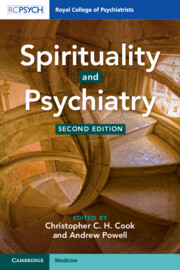Book contents
- Spirituality and Psychiatry
- Spirituality and Psychiatry
- Copyright page
- Contents
- Figures
- Tables
- Boxes
- Contributors
- Foreword to the Second Edition
- Foreword to the First Edition
- Preface to the Second Edition
- Preface to the First Edition
- Acknowledgements
- The Spirituality and Psychiatry Special Interest Group of the Royal College of Psychiatrists: A Personal Reflection
- Chapter 1 Spirituality and Religion in Psychiatry
- Chapter 2 Spiritual Assessment
- Chapter 3 Psychosis
- Chapter 4 Suicide
- Chapter 5 Child and Adolescent Psychiatry
- Chapter 6 Psychotherapy
- Chapter 7 Intellectual Disability
- Chapter 8 Substance Misuse and Addiction
- Chapter 9 Common Mental Disorders
- Chapter 10 Forensic Psychiatry
- Chapter 11 Meditation, Prayer and Healing
- Chapter 12 Religion and Spirituality in the DSM and ICD
- Chapter 13 Spiritual Care in the NHS
- Chapter 14 Spiritual and Religious Interventions
- Chapter 15 The Patient Perspective
- Chapter 16 Religion and Religious Experience
- Chapter 17 Pathological Spirituality
- Chapter 18 Ageing
- Glossary
- Index
- Plate Section (PDF Only)
- References
Chapter 15 - The Patient Perspective
Published online by Cambridge University Press: 07 October 2022
- Spirituality and Psychiatry
- Spirituality and Psychiatry
- Copyright page
- Contents
- Figures
- Tables
- Boxes
- Contributors
- Foreword to the Second Edition
- Foreword to the First Edition
- Preface to the Second Edition
- Preface to the First Edition
- Acknowledgements
- The Spirituality and Psychiatry Special Interest Group of the Royal College of Psychiatrists: A Personal Reflection
- Chapter 1 Spirituality and Religion in Psychiatry
- Chapter 2 Spiritual Assessment
- Chapter 3 Psychosis
- Chapter 4 Suicide
- Chapter 5 Child and Adolescent Psychiatry
- Chapter 6 Psychotherapy
- Chapter 7 Intellectual Disability
- Chapter 8 Substance Misuse and Addiction
- Chapter 9 Common Mental Disorders
- Chapter 10 Forensic Psychiatry
- Chapter 11 Meditation, Prayer and Healing
- Chapter 12 Religion and Spirituality in the DSM and ICD
- Chapter 13 Spiritual Care in the NHS
- Chapter 14 Spiritual and Religious Interventions
- Chapter 15 The Patient Perspective
- Chapter 16 Religion and Religious Experience
- Chapter 17 Pathological Spirituality
- Chapter 18 Ageing
- Glossary
- Index
- Plate Section (PDF Only)
- References
Summary
This chapter explores the ways in which mental health patients experience spirituality, based on case studies of patients and emerging data from an ongoing study in Birmingham, UK. Psychiatric patients commonly experience spirituality/religion as an awareness of something beyond their physical senses that is of great importance to them. Many turn to spirituality when they become unwell, deriving great strength from it, and for most patients it is closely linked with recovery. However, spirituality does not always have a positive impact, and spiritual struggles can increase mental distress. Spirituality thus has a major influence on mental well-being and recovery. Spiritual care aims to overcome spiritual problems and maximise the benefits of spirituality. It involves finding the right person to help each individual and is very popular with patients. Many patients also want to talk about their spirituality with clinicians and have their spiritual needs addressed as part of clinical treatment.
- Type
- Chapter
- Information
- Spirituality and Psychiatry , pp. 293 - 311Publisher: Cambridge University PressPrint publication year: 2022

